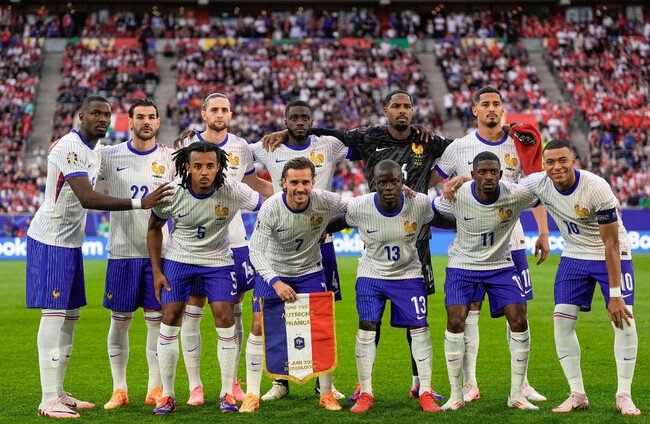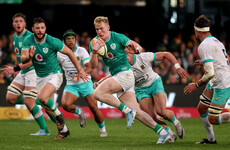IN THE LAST decade, no country has been more consistent in international football than France.
Since Didier Deschamps took over in 2012, of the five major tournaments they competed in, the team reached the final on three occasions.
In 2018, the manager guided them to the World Cup trophy for the second time in their history, while he was the team captain when they won it on the first occasion in 1998.
In Qatar 2022, Deschamps was just a penalty shootout away against a Lionel Messi-inspired Argentina from adding a third World Cup to his CV.
At the Euros this summer, many critics have tipped France to triumph again, citing how reliably they have tended to perform with Deschamps at the helm.
One of the many interesting passages in ‘Va-Va-Voom: The Modern History of French Football’ — an entertaining and meticulously researched new book by the football writer and broadcaster Tom Williams — recounts the words of French legend Alain Giresse.
“With the 2018 team and the current one, you have to look at the football that the players are capable of producing,” he says.
“I say: ‘Okay, you want more elaborate football — give me the names of the players that have those qualities that stayed at home. I’m listening. Give me the names.’ We don’t have the players that other teams have.”
Without the context of who was saying them, you might think those words were said about the Irish team or several other international sides.
Ireland football fans might feel like recent debates about Stephen Kenny’s new style of play versus the merits of a more pragmatic brand of football are unique to the country.
Yet in reality, the style-versus-results discourse impacts virtually every international side.
England fans often lament Gareth Southgate’s supposed inability to “take the handbrakes off”.
Dutch and Brazilian sides are frequently compared unfavourably to their ostensibly more attack-minded and attractive 1970s counterparts.
Metaphorically speaking, every country has at one stage or another had a variation of the Eamon Dunphy pen-throwing incident post-Egypt.
Yet with France, the style is harder to criticise because of the success it has yielded.
But Les Bleus reaching finals of major tournaments was not always the inevitability it feels like today.
For a long time, the French team were considered underachievers on the international stage and this issue still applies at club level.
As Williams notes, before the 2023-24 season, of the 161 major Uefa trophies up for grabs, France have won just two — the 1992-93 Champions League (Marseille) and the 1995-96 Cup Winners’ Cup (PSG) — which leaves them trailing Belgium, Ukraine and Scotland among many others.
Williams cites several factors, such as resisting the arrival of professionalism until 1932 — longer than any other major European nation — and continuing to run its clubs “according to amateur ideals”.
Other factors include “the late onset of urbanisation in the country” and “high tax rates,” which meant Ligue 1 clubs could not offer salaries comparable to other leading footballing nations in Europe. Consequently, the Bosman ruling led to an exodus of top French footballing talents who knew they would earn better wages elsewhere.
“You look at the big Italian and Spanish clubs of the time, and a little bit later in the 1970s, the big German and English clubs, they were all able to draw upon a much healthier footballing culture, full stadiums, more opportunities to generate commercial income, and favours from local authorities,” Williams tells The 42.
“And then, you think about the industrial backing that a lot of the big Italian clubs received, notably in the 1960s, that wasn’t a model that ever existed in France.”
At international level, the 1958 World Cup saw the first great French side, led by stars including Just Fontaine and Roger Piantoni.
Yet this era proved short-lived as these accomplished footballers were not replaced.
Therefore, for around 20 years, French football was struggling badly.
In the next five World Cups after 1958, France did not qualify for three and failed to escape the group stages in the other two.
The great Saint Etienne side is consequently credited with instigating a resurgence in popularity and interest in French football. Between 1956 and 1981, they won 10 league titles and made it to the 1976 European Cup final, narrowly losing 1-0 to Bayern Munich.
“Saint Etienne were almost seen as a de facto national team at the time because the national team itself was in the doldrums,” adds Williams.
Inspired most notably by Michel Platini and the famous magic square midfield encompassing Jean Tigana, Alain Giresse, Bernard Genghini initially, and then Luis Fernandez, France promptly improved.
Yet as fondly remembered as that team are for their technical prowess and the genius of Platini — who, along with Zinedine Zidane, is widely considered the nation’s greatest-ever player — they only won one trophy.
The Euro ’84 triumph was somewhat of an anomaly — France had not even qualified for the previous five tournaments and failed to do so again four years later.
With Platini key, they finished fourth at the 1982 World Cup and third in 1986, but as in 1958, the country failed to build on the success and did not qualify for the 1990 and 1994 tournaments.
By the time of the 1998 World Cup they hosted, there was a perception that “culturally,” France were “not used to winning”.
Everything changed when Aimé Jacquet was appointed manager after the disastrous ’94 World Cup qualifying campaign.
As beautiful as France’s football had been for large portions of the previous 15-20 years, Jacquet was primarily interested in results.
A former defensive midfielder who had been an integral part of the great Saint Etienne side, Jacquet was willing to sacrifice flair players like David Ginola and Eric Cantona in favour of a more cohesive unit and pragmatic approach.
It helped that he had a young Zidane coming through — the primary midfield flair player who was accommodated, and Jacquet built the team around.
That figure was supposed to be Cantona. But after the Man United star received an eight-month ban for kicking a Crystal Palace fan, Zidane locked down the number 10 position while his teammate was suspended.
Jacquet travelled to Manchester in January 1996 and offered Cantona the chance to fill the only vacant role left in the team at centre forward, but this opportunity was declined.
With more solid, defensive-minded midfielders like Deschamps, Christian Karembeu, Patrick Vieira and Emmanuel Petit, France’s football was not always as beautiful to watch in comparison with the Platini era, but the team were abundantly more successful.
The 1998 World Cup was a case in point. Everyone remembers the 3-0 win over Brazil in the final, but that was their only convincing victory in the knockout stages.
They needed extra time to beat Paraguay 1-0 during the round of 16, defeating Italy in the quarters on penalties after a 0-0 draw and narrowly overcame tournament debutants Croatia 2-1 in the semis after going a goal behind.
The purists were not happy but France were triumphant regardless.
Williams elaborates on this dynamic: “There was this idea that French football should be a spectacular, daring, courageous kind of football. And that was the kind of football played by the great France team of the late 1950s.
“The great Reims team of the late 1950s and early 1960s, Michel Hidalgo’s France team in the early ’80s — all teams that played with a certain dash, flair and swagger. But come the early 90s, the team that succeeded the France team in the 1980s hadn’t lived up to expectations.
“[After 1994] this new element in French football starts to assert itself with players who’ve cut their footballing teeth in Italy. Didier Deschamps, Zinedine Zidane, and Marcel Desailly have come through French youth structures, and are well-grounded technically and tactically.
“But they’ve learned in Italy this winning mentality that French football long felt it didn’t have. And, so you get this fairly significant mindset shift in the 1990s. And this started with Platini — he was the only player in that France squad in the mid-80s, who played in Italy.
“But the players from that time talk about Platini’s influence, getting the team to approach matches in a slightly more Italian, cynical way. And so by the time Aimé Jacquet became coach, that is now the mentality.
“It’s not about being crowd-pleasing, entertaining and playing swashbuckling football. It’s about winning football matches, being defensively solid, and lucid in the pivotal moments in matches and tournaments. And that’s the mentality that finally gets France over the line in the 1998 World Cup.”
He continues: “It was a reaction against the false dawn of the late ’80s, early ’90s. Lots of very talented French footballers: Jean-Pierre Papin, Eric Cantona and David Ginola — players who were about as good as anyone in the world at that time but never managed to do the business with France.
“And so, Jacquet oversaw this deliberate move away from the flair-first approach into something a bit more cynical and Italian.”
There have, of course, been examples of countries that have been both successful and great to watch on the international stage, but they are a rare breed.
Often, the significant influence of one club team on a country’s style can help create this alluring blend. For instance, the 2008-2012 Spanish team were dominated by Barcelona players. The same is true of the 1970s Dutch team and Ajax. Yet these are the exceptions rather than the rule.
Williams adds: “And that’s why you go back over the last 20-25 years [and ask] how many successful trophy-winning national teams have there been, who played exciting football?
“I think that managers like Deschamps and Southgate realise that the surest way to success is to just stick to the basics, solid defensive foundations, players who know their roles, a well-identified pattern of playing, and nothing too elaborate, but it’s a particular issue for France because they produce so many talented players.
“People look at the talent at Deschamps’ disposal, and they say these players should be capable of playing more attractive football.
“But the counter-argument is that they won the World Cup in 2018, they reached the 2022 World Cup final, European Championship finals in 2016, they have been the most successful European team of recent years.”
Deschamps’ achievements are all the more impressive when you consider he had inherited a France team that was hardly in good health.
After a Euro 2000 triumph followed the ’98 World Cup success, it was a case of diminishing runs in the ensuing years.
Inspired largely by Zidane’s last hurrah before retiring, France made it to the 2006 World Cup final. But that encouraging run was bookended by group-stage exits in 2002 and 2010. At the latter tournament, a massive row erupted whereby the French team boycotted training at one stage as Nicolas Anelka was banished from the squad and the French Sports Minister was forced to intervene on the orders of President Nicolas Sarkozy.
The Euro 2012 quarter-final exit after a 2-0 defeat by eventual champions Spain was less dramatic.
Nonetheless, Laurent Blanc’s short-lived tenure was marred by a race row. The former Man United player was cleared of discrimination after a recording emerged in which he discussed putting a quota on the number of black and Arab players lining out for French youth teams.
Race was already an especially sensitive issue in French football. The 1998 team, which contained players from many different backgrounds, had been hailed by some for highlighting France’s growing diversity. However, the players themselves were not always comfortable with how they were perceived.
“They have mixed feelings about how they were used as figureheads because none of them asked for that,” Williams explains.
“And they suddenly found themselves depicted as poster boys for what France could look like. And, of course, that team at that time, in particular, was a fantastic representation of France as a country, with people drawn from all over the world — every single corner of the French diaspora was represented in that squad.
“They achieved this historic success in terms of French sport and winning France’s first world title. I think that the feeling at the time was that success had a positive symbolic value. But then very quickly, within a few years, there’s rioting in the Parisian suburbs, the French far-right are on the rise in the presidential elections just as they are today. And the realisation hit home pretty quickly that it would take more than one very successful, very diverse football team to heal France’s various divisions.”
France has a long history of racial tensions when it comes to football — Williams points out how the French team of the 1950s was not considered “sufficiently French,” because there were too many players of Polish extraction, such as Raymond Kopa.
“Sometimes it gets quiet because the team are winning things and everyone’s pulling in the same direction. And then things go badly. And the drumbeat gets louder again, and it’s the black players who are at fault, the team isn’t white and blah, blah, blah.”
Deschamps, who has taken his cue from former national team manager Jacquet by focusing on defensive solidity rather than flair, has managed to unite the squad and succeed despite these tensions perenially lurking beneath the surface.
The former Juventus star’s assured presence was much needed after a disastrous couple of years on and off the field for France.
“Deschamps said, right from the start: ‘We are starting from rock bottom. So we have to be irreproachable in everything that we do. And that means that if someone has behavioural problems, they just won’t get picked.’
“And, I guess the biggest demonstration of that was the fact that he left Karim Benzema in the international wilderness for the best part of six years while he was embroiled in this sex tape saga with Mathieu Valbuena.
“But you go back to Deschamps the player, and I think Deschamps is most at home, or is more at home, in a football changing room, than almost any footballer I can think of.
“He understands the rhythms of a changing room, knows how to spot problems well in advance, knows how to create a healthy winning atmosphere and culture.
“And that has been the source of his success with France and it hasn’t always been exciting to watch, but there is this sense of solidity and solidarity. And whilst there have been the occasional scandal along the way, Deschamps has generally emerged with his reputation intact at every single turn and has succeeded in taking the France national team to a place where they probably had a more enduring run of popularity than at any stage in their history.”
‘Va-Va-Voom: The Modern History of French Football’ by Tom Williams is published by Bloomsbury. More info here.



















17, some achievement! Good luck to her and them all!